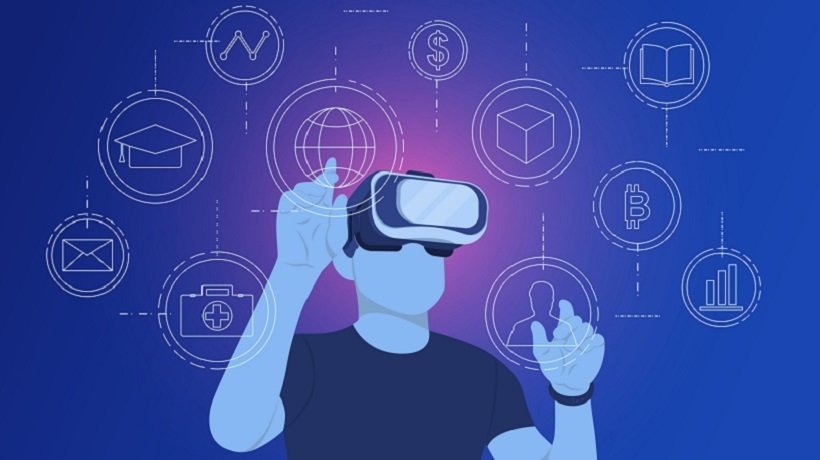Metaverse In Healthcare: How Will It Impact The Industry?
The recent announcement of Facebook’s rebranding to Meta took the internet by storm, making everyone curious about the Virtual Reality-based metaverse and its impact on our lives. However, it’s important to know that Facebook is just one amongst hundreds of key players who have contributed to making the metaverse a reality. Today, many people are unaware of how the metaverse can revolutionize multiple industries, including the healthcare sector. The foundational technology of the metaverse, Virtual Reality (VR), has shown promising results in its healthcare application.
Metaverse And Medical Education
Traditional medical training provides limited resources for the practice of surgeries, partly because procedures on cadavers are costly for hospitals, which also reflects on a student's tuition fees. However, with the use of Virtual Reality in medical training, students can train in a simulated environment for the purpose of immersive surgical training at a significantly lower cost.
Moreover, the dissection of a virtual subject in place of a real cadaver is cost-effective and enables students to work individually for training purposes. The Virtual Reality-based cadaver training sessions can have a performance-enhancing effect on surgical trainees’ technical capabilities, such as precision and decision-making skills.
In the metaverse, the technology will also be utilized in complex surgical procedures, as surgeons always look for better methods to get the job done with a higher success rate. The data set accumulated through a patient's digital twin also allows doctors to predict a patient's recovery time, any possible complications, and the required treatments for these complications as a precautionary measure.
Moreover, while robot-assisted operations are commonplace now for undertaking complex procedures with accuracy and flexibility, Virtual Reality is relatively new as a training and practice tool for surgical procedures. During the pandemic, the need for such a teaching model became crucial as medical colleges and nursing schools had to terminate offline classes, causing immense distress to all students. Indeed, the metaverse can resolve many of these woes faced by the healthcare industry's education sector.
Meta-Hospitals: A Convergence Of Metaverse And Healthcare
Since the pandemic, online medical consultation has seen an unprecedented surge because remote consultation is far more convenient for diseases and illnesses requiring only visual examination. And as it’s incredibly challenging for some elderly patients to visit doctors, the online consultation trend will likely continue even after the pandemic. This need for remote consultation and the ongoing endeavors to use Virtual Reality in the medical industry make it highly plausible for these remote consultations to shift from video calling apps to the more immersive and advanced world of the metaverse. Instead of relying on local online consultation services, a worldwide network of doctors in the metaverse can bridge the gap between patients and medical carers by providing quality medical services that may not be accessible locally.
It may sound odd for adults to opt for a platform with cartooned avatars in a make-belief world comprising all things virtual. But the implications of the metaverse are such that it promises to revolutionize medical processes. For instance, it can share a patient’s entire medical history with their doctor, all of it compiled and categorized for reference in a way that would save both the doctor’s and the patient’s time. Meanwhile, the VR experience of the metaverse can also allow doctors to have a more detailed look at a patient’s radiology reports through high-resolution 3D modeling. On top of that, the advancing technology and portable healthcare gadgets such as an oximeter, heart rate monitor, and blood pressure monitor that can sync with the internet allow for data collection right from your home. As the future of healthcare is data-driven, a patient's data can massively improve the diagnosis and treatment of their health issues.
If we talk about how the metaverse can change the way operation theaters operate, its implications are far-reaching. For instance, surgeons can conduct live surgical procedures for training purposes or contact specialists for assistance in case of an emergency, with fully integrated monitoring of vital signs and invasive procedures. Moreover, it’s common to see young children disgruntled with boredom or fear of clinics and hospitals. In that case, the metaverse can provide a more playful experience while visiting a doctor, which could help remove their worries. At the same time, it could also make it easier to educate children on the importance of hygiene and healthy eating in a fun and interactive way.
Use Of Virtual Reality For Patient Therapy
The metaverse has immense potential to equip doctors with new therapeutic treatments. Today, doctors can treat people with acrophobia or glossophobia by gradually and repeatedly placing them in challenging yet safe situations that help them to train their minds against these phobias. The use of Virtual Reality for the treatment of mental disorders such as OCD and social anxiety has also become a widely known phenomenon.
The metaverse will also provide a safe space for people who need guidance through virtual support groups. Sadly, the dilemma with the current support groups is a lack of communication between members. Facebook communities and support groups frequently see people coming to ask a question and then remain inactive. But in the metaverse, these platforms can be more interactive and engaging with voice support, community games, etc.
Also, the ability to utilize haptic sensors makes it possible to create rehabilitation programs that can help patients such as those who have Parkinson’s disease to overcome the severity of their illness. Companies such as XRHealth have been working on utilizing VR technology for physical and occupational therapy purposes. As reported by The Denver Post, a patient named Michael Heinrich who opted for VR therapy felt that the enjoyable experience of "being an eagle trying to go through rings" allowed him to push through the boundaries of what he believed was possible as a partially paralyzed patient. The unconventional method treats the patients not only physiologically but also psychologically, speeding up their healing process.
These psychological factors have proven influential in pain management, as doctors have noticed that VR technology substitutes opioid use during wound redressing of burn victims. Similarly, children who underwent a blood test immersed in a VR enhanced intervention felt significantly less pain compared to children who were distracted by traditional methods. While the practice of color and sound therapy dates back thousands of years, applying that to the VR experience for soothing a patient’s mind is a very recent practice that has borne fruitful results. Thus, the healthcare industry is likely to engage patients in the metaverse for more effective pain management.
To Sum It Up
Despite the privacy and security concerns revolving around the idea of the metaverse, doctors are all set to leverage technological advancements for improved patient care. That's because Web 3.0, which is the foundation for the metaverse, is based on blockchain technology and will comprise decentralized applications that support a decentralized crypto economy. Moreover, the VR healthcare industry was worth $1206.6 million in 2021 and is estimated to reach $11,657.8 million by 2028, making it evident that a VR-based metaverse will play a pivotal role in revolutionizing the healthcare industry with further technological advancements. Given that the Internet of Things is gaining momentum, it would be interesting to witness more discoveries in healthcare.










